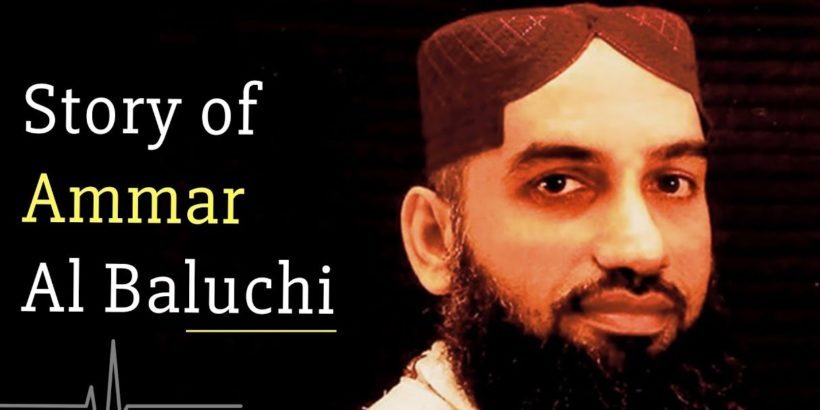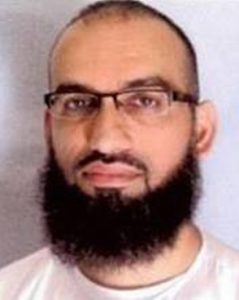 Preview: Ammar al Baluchi is incarcerated at GITMO in Guantanamo Bay, Cuba as one of the accused 9/11 Conspirator/Terrorists. He is one of the 5 being tried together in the KSM et al pre-trial Military Tribunals.
Preview: Ammar al Baluchi is incarcerated at GITMO in Guantanamo Bay, Cuba as one of the accused 9/11 Conspirator/Terrorists. He is one of the 5 being tried together in the KSM et al pre-trial Military Tribunals.
Researched and Written by Diana Davenport
Although you have likely never heard his name, Ammar al Baluchi’s story is also our story – yours and mine. It changed our world, and continues to affect the way way live every day. Because the story is not over, its significance and future outcome are very relevant for us today and for generations to come.
Let’s start with the basic facts. According to Wikipedia, Al Baluchi is a citizen of Pakistan, born and raised in Kuwait in 1977. (1) He spent much of his teens in Iranian Balochistan. “Very open-minded and western-oriented,” he was trained as a computer technician, and was a self-described businessman. According to CAGE, a Youtube channel, his father was a “well-educated, religious man, who authored several books.” His mother is the sister of Khalid Shaikh Mohammad (KSM). (2) Wait, what? The same KSM that is charged with planning the 9/11 attacks? Yes, that one.
There are also the official public details. Let’s unpack them a bit, shall we?
Al Baluchi, along with his uncle, and three other men are being tried collectively in the case The United States v. Khalid Shaikh Mohammad, et al. The five are charged with various crimes related to the attacks of September 11, 2001. Al Baluchi’s primary charge is financial involvement. James Connell, a member of his defense team stated in a Guardian documentary The Trial, “The biggest charge against him is that, in the conspiracy that led up to the attacks, he was given some money… Somebody called and asked for the money, and he wired the money to that person.” (3) Al Baluchi’s ex-wife, Aafia Sidiqqui was also charged with crimes but was tried in New York City and sentenced to 86 years in prison.
Al Baluchi was captured in Karachi, Pakistan on April 29, 2003 with one of his fellow defendants, Walid bin Attash by the Pakistani Intelligence Bureau and a team of Pakistani Rangers. A Senate Select Committee on Intelligence (SSCI) report reveals that he was held in foreign custody and interrogated regarding a planned attack on the U.S. Consulate in Karachi. According to The Rendition Project, the timeline suggests al Baluchi and bin Attash entered CIA custody on May 15-16, 2003 and remained in CIA custody until late summer of 2006. The CIA held them at several locations including sites in Afghanistan, Morocco, Romania, and an unknown location which circumstances suggest was in Poland. From there they were taken to Guantanamo Bay, Cuba where they remain, awaiting trial with their co-defendants in U.S. Military custody. (4)
Though you’ve likely not heard of him, al Baluchi’s experience is, in a way, somewhat famous. Movie goers may recall the 2012 film, Zero Dark Thirty. The opening 25 minutes of the movie is a dramatic portrayal of the torture al Baluchi was subjected to while in CIA custody. Though the actual torture lasted well beyond 25 minutes, the defense team is bothered by its accuracy in all other regards. Although the CIA worked with the film-makers for a year on the film, the same information they shared is unavailable to Baluchi’s defense team because it is “classified.” (5)
The government-appointed defense team is hamstrung because all of the information regarding the case is deemed classified and remains unavailable to them. They do not have access to any information required by them to do their jobs as defendants. The majority of their work thus far has been regarding procedures, efforts to obtain evidence, and regular endeavors to enhance trust and rapport with their clients. That segues right into the next complicated aspect of this trial.
“Guantanamo occupies a strange space in American jurisprudence,” points out defense team member Connell in the Guardian documentary, adding that it was selected by the Bush administration because, “It is the legal equivalent of outer space,” in their thinking. Defense team member Sterling Thomas adds, “It’s considered extraterritorial to many of the laws of the United States.” (3) The Constitution doesn’t directly apply there. When the defense team inquired as to which constitutional provisions do apply there, they were told that will be decided as each issue arises. There is no established protocol or process. The prosecution and defense argue each point as it comes up. The rules are literally being made up as the case goes along.
Is there anything else worth knowing about Ammar al Baluchi? Like most stories, this one has another side. Some people know a different Ammar, whose birth-name is Ali Abdul Aziz Ali. “Ammar has written extensively about what happened to him.” His writings however are not available because they have been classified. Though it wasn’t stated how it was obtained, CAGE’s video reveals a 2015 quote from Ammar:
“My memories are classified, my thoughts are classified, my pain and suffering is classified.” The video also shows a piece of his artwork entitled “Vertigo at Guantanamo,” which is one of many pieces he has made as a sort of therapy during his time at GITMO. Though not stated in the video, the piece appears to be watercolor. It was created as an effort to convey his feelings of his experience and was displayed in a show in New York City in 2017. Following the exhibit, the Department of Defense prohibited the exhibition of his art. (2)
One thing that most can agree on, is that this case is a story of frustration – if only because I can’t think of a stronger word with quite the same meaning. If such a word exists, it definitely applies here. Everyone involved is beyond frustrated, with perhaps the lone exception of the government. Certainly the defendants, their defense team, the victims’ families, and the interested public are extremely weary of waiting for an outcome in this case. In The Trial, Steven J Hagis, whose son Steven M. Hagis was killed in the World Trade Center, addressed a small crowd of victims’ families from a podium. “I don’t think this is gonna be resolved in my lifetime,” he said, displaying palpable defeat.
Why is there no resolution? What’s the hold up? Don’t the families have the right to a conclusion? Why is justice not swift and final in this case? What in the world is going on down at Gitmo? These are legitimate questions. As it turns out, we have the right to know the answers.
In a very worthwhile 2002 article from The Nation, Justice Can’t Be Done in Secret, this matter is given greater attention than I am able to provide here. I will however touch on some relevant points from that article (which I encourage you to read: https://www.thenation.com/article/justice-cant-be-done-secret/). (6)
A 1980 Supreme Court decision in Richmond Newspapers v. Virginia ruled that public access to criminal trials and courts martial is a First Amendment right. A right not awarded to the the plaintiff or the defendant, but to the press and public. As stated in The Nation article:
“…a separate right of access to attend trials also arises from the First Amendment. That right to attend criminal proceedings–which belongs to the press and public, not to the defendants–mandates that trials be open, absent compelling and clearly articulated reasons for closing them. “
Further history provided in the article goes back to J. Edgar Hoover and his use of a closed military tribunal for political optics in which eight German saboteurs were found guilty. Six of them were sentenced to death and the other two to life in prison. Later when the secret files were opened under Truman, it was found that the two men who received life sentences had actually been Nazi defectors. The two had exposed the plot to the FBI who then made swift work of the case. Hoover enjoyed being lauded for his professional prowess and sacrificed two men who were actually heroes to Americans to rot in prison, all for the sake of appearances. Not only was this an injustice to these brave men but deprived our country of whatever gains such men would have afforded us.
This brings us to former President George W. Bush and his administration. Why did they not try these accused terrorists in federal court, like they did the wife of al Baluchi? Was there something they were trying to hide? Was it to their political advantage that no court had ever ruled on the right of the press and public to have access to a military tribunal, like they had for criminal courts and courts martial? Did they bury the story in the cages of Guantanámo where the rules don’t apply, for some kind of personal gain or protection?
This is only speculation to ponder, but in an era where a quick google search reveals that a majority of Americans do not believe the official story of that fateful day, these are legitimate questions to raise. There is hardly consensus among 9/11 conspiracy theorists as a host of ideas have been put forth. Is one theory the right one? Or is it, as I expect, a piecemeal of various ideas that have been proposed? Or perhaps the official story is true after all? Don’t we deserve to know?
We may finally have the chance to find out the answers to the many questions which have plagued us for almost two decades. Under G.W. Bush, it was possible for the presiding judge of a military tribunal to close the court at his own discretion. President Trump has changed the rules. Now the judge must meet stringent requirements to close the tribunal or it must remain open to the press. The press-room at GITMO is quite small and there will be no media circus there. Corporate news media is not invited to witness the proceedings. However the Department of Defense is vetting independent news organizations to cover the proceedings via closed circuit television at select military bases within the U.S., as reported by C-Vine Network, a charitable trust and independent platform for free speech. Pretrial information including courtroom transcripts is posted on their website (https://c-vine.com/military-tribunals/). They will be posting regular updates as things progress. (7)
One thing is certain: there is no shortage of people who would love to see all of this come to a close. With public scrutiny of testimony from the military tribunal, United States v. Khalid Shaihk Mohammad, et al., the truth may finally come to light.
Will we learn the names of others within al Qaida who were involved? Or will we find that actors within our own government have been hiding the truth from us for their own gain? Whatever the answers, We the People, have a right to them. If you are like me, what matters most is that we finally learn the truth, whatever it may be.
Sources:
1) Wikipedia, Ammar al Baluchi
https://en.wikipedia.org/wiki/Ammar_al-Baluchi
2) CAGE youtube channel short film, The Story of Ammar al Baluchi; Posted Jan 17,
2019 https://www.youtube.com/watch?v=BtsEuRq8iLA
3) The Guardian documentary, The Trial; Feb 2019
https://www.theguardian.com/us-news/ng-interactive/2019/feb/22/the-trial-inside-t
He-ammar-al-baluchi-guantanamo-trial-video
4) The Rendition Project; date not provided
https://www.therenditionproject.org.uk/prisoners/ammar-albaluchi.html
5) The Guardian article: CIA gave details of 9/11 suspect’s secret torture to film-makers,
lawyers say; Feb 22, 2019
https://www.theguardian.com/law/2019/feb/22/ammar-al-baluchi-pre-trial-911-cia-
6) The Nation article, Justice Can’t Be Done in Secret; May 23, 2002
https://www.thenation.com/article/justice-cant-be-done-secret/
7) C-Vine News Network, Military Tribunals tab; Jan 28, 2019 – Present
RESEARCH LINKS AND GROUPS FOR DISCUSSION:
Join our Group Discussion about this report on our Facebook Group Page. Must be a member to comment – C-VINE International News Network.
U.S. v Khalid Shaikh Mohammed et al (2) March 2019 Transcripts
Following is a report on the 5 individuals in KSM et al being tried. (Note: Included here is a link to read the ENTIRE report that will go into depth on exactly who all the names are at GITMO above and beyond these 5 and how many people total are there now):
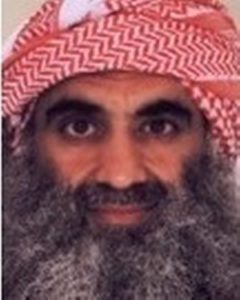 Khalid Sheik Mohammed, called KSM, is accused of engineering the Sept. 11 attacks by proposing the plot to Osama bin Laden in 1996, overseeing the operation and training the hijackers in Afghanistan and Pakistan. The International Committee of the Red Cross says Pakistani authorities arrested him March 1, 2003 in Rawalpindi, Pakistan. The CIA waterboarded him before his 2006 transfer to Guantánamo Bay. In March 2007, according to a military transcript, he boasted: ‘‘I was responsible for the 9/11 operation — from A to Z.” In court, he typically wears a hunting pattern camouflaged jacket or vest, an attire he adopted after his lawyers litigated and won the right for him to do so in 2012. He has argued through his lawyers that that he considers himself a legitimate combatant entitled to Geneva Convention status as a prisoner of war. At Guantánamo, Mohammed has described himself as a revolutionary-like George Washington.
Khalid Sheik Mohammed, called KSM, is accused of engineering the Sept. 11 attacks by proposing the plot to Osama bin Laden in 1996, overseeing the operation and training the hijackers in Afghanistan and Pakistan. The International Committee of the Red Cross says Pakistani authorities arrested him March 1, 2003 in Rawalpindi, Pakistan. The CIA waterboarded him before his 2006 transfer to Guantánamo Bay. In March 2007, according to a military transcript, he boasted: ‘‘I was responsible for the 9/11 operation — from A to Z.” In court, he typically wears a hunting pattern camouflaged jacket or vest, an attire he adopted after his lawyers litigated and won the right for him to do so in 2012. He has argued through his lawyers that that he considers himself a legitimate combatant entitled to Geneva Convention status as a prisoner of war. At Guantánamo, Mohammed has described himself as a revolutionary-like George Washington.
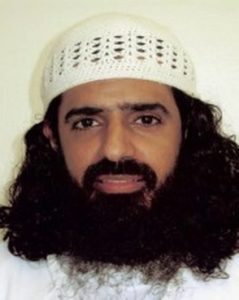 Walid bin Attash, allegedly ran an al Qaida training camp in Logar, Afghanistan, where two of the 19 Sept. 11 hijackers were trained. Osama bin Laden allegedly selected him as a Sept. 11 hijacker but he was prevented from participating when he was arrested and briefly detained in Yemen in early 2001. The Pentagon also says he traveled to Malaysia in 1999 to study U.S. airline security. The ICRC says Pakistani authorities arrested him on April 29, 2003 in Karachi, Pakistan. In court, he has banished his Pentagon paid defense attorneys from sitting at his defense table in a repeated effort to try to fire them. His trial judges have found that he has no good cause to do so, so his lawyers sit at the rear of the court when he attends hearings. Prosecutors at times call him “Khallad,” a name he used before his capture.
Walid bin Attash, allegedly ran an al Qaida training camp in Logar, Afghanistan, where two of the 19 Sept. 11 hijackers were trained. Osama bin Laden allegedly selected him as a Sept. 11 hijacker but he was prevented from participating when he was arrested and briefly detained in Yemen in early 2001. The Pentagon also says he traveled to Malaysia in 1999 to study U.S. airline security. The ICRC says Pakistani authorities arrested him on April 29, 2003 in Karachi, Pakistan. In court, he has banished his Pentagon paid defense attorneys from sitting at his defense table in a repeated effort to try to fire them. His trial judges have found that he has no good cause to do so, so his lawyers sit at the rear of the court when he attends hearings. Prosecutors at times call him “Khallad,” a name he used before his capture.
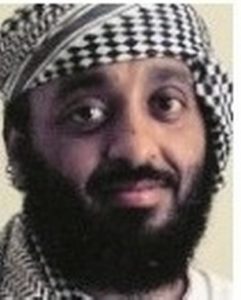 Ramzi bin al Shibh, a Yemeni, allegedly helped the German cell of hijackers find flight schools and enter the United States, and helped finance the operation. He allegedly was selected to be one of the hijackers and made a ‘‘martyr video,” but was four times denied a visa at U.S. embassies, in both Berlin and his native Sana’a, Yemen. The ICRC says Pakistani authorities arrested him Sept. 11, 2002 in Karachi, Pakistan, the first of the five alleged conspirators in the 9/11 attacks. Bin al Shibh has argued for years, mostly through his lawyers but at times through disruptions, that somebody at the clandestine Camp 7 prison where he and the others are held is disrupting his sleep through noises and vibrations. Prosecutors deny the event is happening. In 2016 he testifiedabout the issue and the first trial judge ordered the prison to stop doing it, if they are indeed doing it.
Ramzi bin al Shibh, a Yemeni, allegedly helped the German cell of hijackers find flight schools and enter the United States, and helped finance the operation. He allegedly was selected to be one of the hijackers and made a ‘‘martyr video,” but was four times denied a visa at U.S. embassies, in both Berlin and his native Sana’a, Yemen. The ICRC says Pakistani authorities arrested him Sept. 11, 2002 in Karachi, Pakistan, the first of the five alleged conspirators in the 9/11 attacks. Bin al Shibh has argued for years, mostly through his lawyers but at times through disruptions, that somebody at the clandestine Camp 7 prison where he and the others are held is disrupting his sleep through noises and vibrations. Prosecutors deny the event is happening. In 2016 he testifiedabout the issue and the first trial judge ordered the prison to stop doing it, if they are indeed doing it.
 Ammar al Baluchi, charged as Ali Abd al Aziz Ali, is alleged to have sent approximately $120,000 to the hijackers for their expenses and flight training, and helped nine of them travel to the United States. He was born and raised in Kuwait, and is Khalid Sheik Mohammed’s nephew because his mother is KSM’s brother. The ICRC says Pakistani authorities arrested him on April 29, 2003 in Karachi, Pakistan. His U.S.-educated wife, Aafia Sidiqqui, was captured in Afghanistan but unlike her husband was taken to New York City for trial. She is now serving an 86-year sentence. His lawyers have been the most aggressive and by some measures most creative in filing legal challenges to the proceedings. In one failed effort to get discovery about what happened to their client in CIA custody they argued that the makers of the Hollywood film ‘Zero Dark Thirty’ got more details than they did.
Ammar al Baluchi, charged as Ali Abd al Aziz Ali, is alleged to have sent approximately $120,000 to the hijackers for their expenses and flight training, and helped nine of them travel to the United States. He was born and raised in Kuwait, and is Khalid Sheik Mohammed’s nephew because his mother is KSM’s brother. The ICRC says Pakistani authorities arrested him on April 29, 2003 in Karachi, Pakistan. His U.S.-educated wife, Aafia Sidiqqui, was captured in Afghanistan but unlike her husband was taken to New York City for trial. She is now serving an 86-year sentence. His lawyers have been the most aggressive and by some measures most creative in filing legal challenges to the proceedings. In one failed effort to get discovery about what happened to their client in CIA custody they argued that the makers of the Hollywood film ‘Zero Dark Thirty’ got more details than they did.
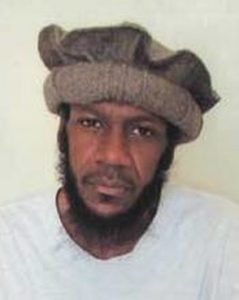 Mustafa Ahmad al Hawsawi, a Saudi, is alleged to have helped some of the hijackers with money, Western clothing, traveler’s checks and credit cards from an office in Dubai. The ICRC says Pakistani authorities arrested him March 1, 2003 in Rawalpindi, Pakistan. Hawsawi served as a witness via a sworn statement conveyed by the CIA in the Zacarias Moussaoui trial, saying he had seen Moussaoui at an al Qaida guesthouse in Kandahar, Afghanistan, in the first half of 2001, but was never introduced to him nor conducted operations with him. This slight captive who suffered rectal damage in agency custody, according to the so-called Senate Torture Report, generally only comes to court on the days the judge mandates it. His lawyers for years have sought to have his case peeled off from the other four, severed as they say in court, to obtain swifter resolution. Prosecutors have opposed a separate trial for Hawsawi and the judge has so far rebuffed those efforts.
Mustafa Ahmad al Hawsawi, a Saudi, is alleged to have helped some of the hijackers with money, Western clothing, traveler’s checks and credit cards from an office in Dubai. The ICRC says Pakistani authorities arrested him March 1, 2003 in Rawalpindi, Pakistan. Hawsawi served as a witness via a sworn statement conveyed by the CIA in the Zacarias Moussaoui trial, saying he had seen Moussaoui at an al Qaida guesthouse in Kandahar, Afghanistan, in the first half of 2001, but was never introduced to him nor conducted operations with him. This slight captive who suffered rectal damage in agency custody, according to the so-called Senate Torture Report, generally only comes to court on the days the judge mandates it. His lawyers for years have sought to have his case peeled off from the other four, severed as they say in court, to obtain swifter resolution. Prosecutors have opposed a separate trial for Hawsawi and the judge has so far rebuffed those efforts.
Source from the Office of the Secretary of Defense: https://www.mc.mil/CASES.aspx
An Additional 4 Proceedings are also being Held With the Following Individuals:
| USS Cole: Abd al-Rahim Hussein Muhammed Abdu Al-Nashiri |
| Abd al-Rahim Hussein Muhammed Abdu Al-Nashiri (Saudi Arabian) Al-Nashiri is charged with perfidy, murder in violation of the law of war, attempted murder in violation of the law of war, terrorism, conspiracy, intentionally causing serious bodily injury, attacking civilians, attacking civilian objects, and hazarding a vessel. The charges arise out of an attempted attack on the USS THE SULLIVANS in January 2000, an attack on the USS COLE in October 2000, and an attack on the MV Limburg in October 2002.In August 2014, Mr. al Nashiri’s military trial judge dismissed the charges and specifications stemming from the M/V Limburg bombing. The Government immediately appealed that ruling to the U.S. Court of Military Commission Review (CMCR). Two military judges and one civilian judge were assigned to hear the Government’s interlocutory appeal. In September 2014, Mr. al Nashiri moved to recuse the two military judges. He alleged that military judges are assigned to the CMCR in violation of the Appointments Clause, U.S. CONST. art. II, § 2, cl. 2, and cannot be freely removed in violation of the Commander-in-Chief Clause, id. cl. 1. The CMCR denied Mr. al Nashiri’s motion in October 2014. Mr. al Nashiri then filed a petition requesting the U.S. Court of Appeals for the D.C. Circuit to issue a writ of mandamus and prohibition disqualifying the military judges on his CMCR panel. On June 23, 2015, the D.C. Circuit issued its opinion, denying Mr. al Nashiri’s petition because he could adequately raise his constitutional challenges on appeal from final judgment. |
| Majid Shoukat Khan |
| Majid Shoukat Khan was charged before a military commission with conspiracy, murder in violation of the law of war, attempted murder in violation of the law of war, providing material support for terrorism, and spying.
Mr. Khan resided with his family near Baltimore, Maryland, from 1996 through 2002. Shortly after September 11, 2001, he traveled to Pakistan to explore the possibility of entering Afghanistan for the purpose of jihad. While in Pakistan, Khan agreed to be a suicide bomber in a failed al-Qaeda plot to assassinate the former Pakistani President Pervez Musharraf. He subsequently returned to the United States gathering information for future terrorist activities, and later covertly delivered $50,000 of al-Qaeda money to Jemaah Islamiyah to finance the Indonesian J.W. Marriott hotel bombing in August 2003, which resulted in the killing of 11 people. On February 29, 2012, Khan pled guilty to the charged offenses. As part of his pretrial agreement, Khan agreed to delay his sentence proceeding for four years, from the date the military judge accepted his plea, in order to cooperate with the government. At Mr. Khan’s request, and upon agreement with the Convening Authority for Military Commissions, on September 16, 2016, the military judge permitted Khan to withdraw his guilty plea to the charge of providing material support for terrorism, as, in a separate commissions’ case, the U.S. Circuit Court for the District of Columbia had determined that charge can’t be tried at a military commission. Also at Khan’s request, the military judge deferred sentencing proceedings for an additional three years. |
| Abd al Hadi al-Iraqi |
| Abd al Hadi al-Iraqi (Iraqi) Mr. Hadi al-Iraqi is charged with Denying Quarter, Attacking Protected Property, Using Treachery or Perfidy, and Attempted Use of Treachery or Perfidy in a series of attacks in Afghanistan and Pakistan between about 2003 and 2004, and Conspiracy to commit law of war offenses. Pretrial proceedings are on-going. Next series on March 1, 2019. |
| Almed Mohammed Ahmed Haza al Darbi |
| Almed Mohammed Ahmed Haza al Darbi (Saudi Arabian) Al Darbi was charged with providing material support for terrorism and conspiracy for allegedly planning to carry out terrorist attacks against shipping vessels in the Straits of Hormuz. The charges were dismissed without prejudice. |
Cases going on right now at GTMO: https://www.mc.mil/CASES.aspx
As of right not there are 40 detainees … some who have not been charged. Those who are not being charged are held under the classification of AUMF – which stands for Authorized Use of Military Force AND was passed in 2001. It is now being appealed and argued these people should be charged or released. All are of Middle Eastern Descent.
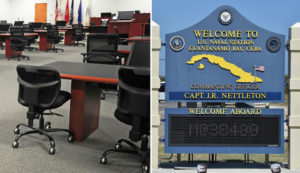
Conversations and discussions are being held on the C-VINE News Talk – Facebook Group Page. (Must be a Facebook member): C-VINE News Talk

